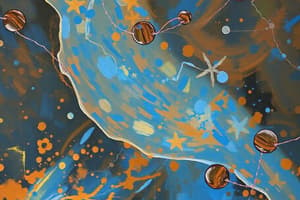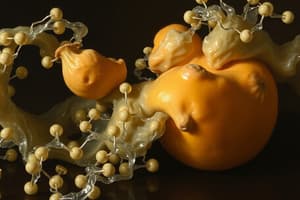Podcast
Questions and Answers
Which enzyme is primarily responsible for digesting triglycerides?
Which enzyme is primarily responsible for digesting triglycerides?
- Phospholipase
- Pancreatic lipase (correct)
- Acyl-CoA synthetase
- Cholesterol esterase
What is the primary function of hormone-sensitive lipases in adipocytes?
What is the primary function of hormone-sensitive lipases in adipocytes?
- Synthesize cyclic AMP
- Transport fatty acids to mitochondria
- Convert glycerol to glucose
- Hydrolyze triacylglycerols to produce fatty acids (correct)
Which of the following substances forms micelles after lipid digestion?
Which of the following substances forms micelles after lipid digestion?
- Triglycerides and bile salts
- Free fatty acids (correct)
- Glycerol only
- Cholesterol esters
During the transport of fatty acids to the mitochondria, which molecule is involved in the activation process?
During the transport of fatty acids to the mitochondria, which molecule is involved in the activation process?
What does the β-oxidation of fatty acids primarily remove?
What does the β-oxidation of fatty acids primarily remove?
Which hormone signals the release of free fatty acids from adipose tissue?
Which hormone signals the release of free fatty acids from adipose tissue?
What is the final product of the complete oxidation of palmitic acid?
What is the final product of the complete oxidation of palmitic acid?
What inhibits fatty acid synthesis during fasting?
What inhibits fatty acid synthesis during fasting?
Which enzyme is responsible for converting acyl-CoA to acyl trans enoyl-CoA during β-oxidation?
Which enzyme is responsible for converting acyl-CoA to acyl trans enoyl-CoA during β-oxidation?
What is the function of carnitine shuttle in lipid metabolism?
What is the function of carnitine shuttle in lipid metabolism?
Which stage occurs first in the complete oxidation of fatty acids?
Which stage occurs first in the complete oxidation of fatty acids?
What is the net ATP yield from the oxidation of one molecule of palmitic acid?
What is the net ATP yield from the oxidation of one molecule of palmitic acid?
Which enzyme is responsible for converting Acetyl CoA to Malonyl CoA?
Which enzyme is responsible for converting Acetyl CoA to Malonyl CoA?
Where does de novo synthesis of fatty acids primarily occur?
Where does de novo synthesis of fatty acids primarily occur?
High levels of which substance lead to the inhibition of fatty acid synthesis?
High levels of which substance lead to the inhibition of fatty acid synthesis?
Which metabolic pathway primarily provides NADPH for fatty acid synthesis?
Which metabolic pathway primarily provides NADPH for fatty acid synthesis?
Flashcards
Lipid digestion
Lipid digestion
Breakdown of dietary fats into smaller molecules, primarily fatty acids and glycerol, for absorption.
Pancreatic lipase
Pancreatic lipase
Enzyme that breaks down triglycerides into fatty acids and glycerol.
Mobilization of fatty acids
Mobilization of fatty acids
Release of stored fatty acids from adipose tissue in response to low energy levels.
Hormone-sensitive lipases
Hormone-sensitive lipases
Signup and view all the flashcards
Fatty acid activation
Fatty acid activation
Signup and view all the flashcards
Carnitine shuttle
Carnitine shuttle
Signup and view all the flashcards
Beta-oxidation
Beta-oxidation
Signup and view all the flashcards
Acyl-CoA dehydrogenase
Acyl-CoA dehydrogenase
Signup and view all the flashcards
β-oxidation of Fatty Acids
β-oxidation of Fatty Acids
Signup and view all the flashcards
Where does β-oxidation occur?
Where does β-oxidation occur?
Signup and view all the flashcards
What is the end product of β-oxidation?
What is the end product of β-oxidation?
Signup and view all the flashcards
What is the role of Thiolase in β-oxidation?
What is the role of Thiolase in β-oxidation?
Signup and view all the flashcards
Why is β-oxidation NOT the reverse of fatty acid synthesis?
Why is β-oxidation NOT the reverse of fatty acid synthesis?
Signup and view all the flashcards
What is the committed step in fatty acid synthesis?
What is the committed step in fatty acid synthesis?
Signup and view all the flashcards
What is the role of NADPH in fatty acid synthesis?
What is the role of NADPH in fatty acid synthesis?
Signup and view all the flashcards
How does malonyl-CoA regulate fatty acid metabolism?
How does malonyl-CoA regulate fatty acid metabolism?
Signup and view all the flashcards
Study Notes
Lipid Metabolism Lecture 9
- Diet contains triglycerides, cholesterol, fatty acids, and phospholipids.
- Most triglycerides are digested by pancreatic lipase, which acts on emulsified lipids.
- Products of triglyceride digestion are 3 fatty acids and one glycerol molecule.
- Phospholipids are digested by phospholipases (A1, A2, C, and D) secreted by pancreas and intestines.
- Cholesterol esterase hydrolyzes cholesterol esters to free cholesterol and one fatty acid.
- Primary products of lipid digestion include free fatty acids, free cholesterol, and glycerol.
- These products, along with bile salts, form micelles (disk-shaped structures).
Mobilization of Fatty Acids from Adipocytes
- When energy supply from diet is limited, the body releases glucagon, epinephrine, or adrenocorticotropic hormone (ACTH).
- These hormones bind to adipocyte cell membranes and stimulate cyclic AMP (cAMP) synthesis.
- cAMP activates a protein kinase that phosphorylates and activates hormone-sensitive lipases.
Transport of Fatty Acids to Mitochondria
- Free fatty acids (FFAs) bind to albumin in the blood plasma and are transported to peripheral tissues.
- Glycerol is taken up by the liver and converted to glucose or pyruvate.
- Fatty acids must be activated by reaction with coenzyme A (CoA) at the expense of ATP, before entering mitochondria.
- The reaction is catalyzed by acyl-CoA synthetase (thiokinase) found in the cytosol and mitochondria.
Carnitine Shuttle
- Fatty acids enter mitochondria via a carrier protein called the carnitine shuttle.
- This shuttle carries the fatty acid from the cytosol to the mitochondria.
β-Oxidation of Fatty Acids
- β-oxidation is the successive oxidative removal of two carbons in the form of acetyl-CoA, starting from the carboxyl end of the fatty acid.
- It requires a set of enzymes and occurs in the mitochondria.
- The β-carbon is oxidized during the process.
- The cycle is repeated several times, depending on the length of the fatty acid chain. Palmitic acid (16 carbons) requires 7 cycles.
β-Oxidation Steps
- Acyl-CoA dehydrogenase converts acyl-CoA to acyl-trans-enoyl-CoA.
- Hydratase converts acyl-trans-enoyl-CoA to 3-hydroxyacyl CoA.
- Hydroxyacyl-CoA dehydrogenase converts 3-hydroxyacyl-CoA to 3-ketoacyl-CoA.
- Thiolase converts 3-ketoacyl-CoA to acetyl-CoA and a shorter acyl-CoA.
Complete Oxidation of Fatty Acids
- The complete oxidation of a fatty acid involves two stages: the formation of acetyl-CoA, and the oxidation of acetyl-CoA to CO2 and water via the citric acid cycle.
- For example, palmitoyl-CoA + 7 FAD + 7 NAD + 7 CoA → 8 acetyl-CoA + 7 FADH2 + 7 NADH2.
Energetics of Palmitic Acid Oxidation
- One palmitic acid molecule yields 131 ATPs, but 2 ATPs are used for activation.
- Therefore, the net ATP gain is 129.
Fatty Acid Synthesis
- Fatty acids can be synthesized de novo in the body, in the cytosol of liver, lactating mammary gland, adipose tissue, and renal cortex.
- Acetyl-CoA is converted to malonyl-CoA by acetyl-CoA carboxylase.
- Malonyl-CoA and acetyl-CoA are attached to acyl carrier protein (ACP).
- The process involves condensation, reduction, dehydration and reduction steps.
- The main sources of NADPH for fatty acid synthesis are the pentose phosphate shunt.
Regulation of Fatty Acid Synthesis
- High carbohydrate diets increase synthesis.
- Palmitoyl CoA inhibits synthesis.
- Fasting decreases fatty acid synthesis.
- Insulin stimulates synthesis.
- Malonyl CoA inhibits fatty acid oxidation by inhibiting the carnitine shuttle, preventing simultaneous fatty acid synthesis and oxidation.
Studying That Suits You
Use AI to generate personalized quizzes and flashcards to suit your learning preferences.




